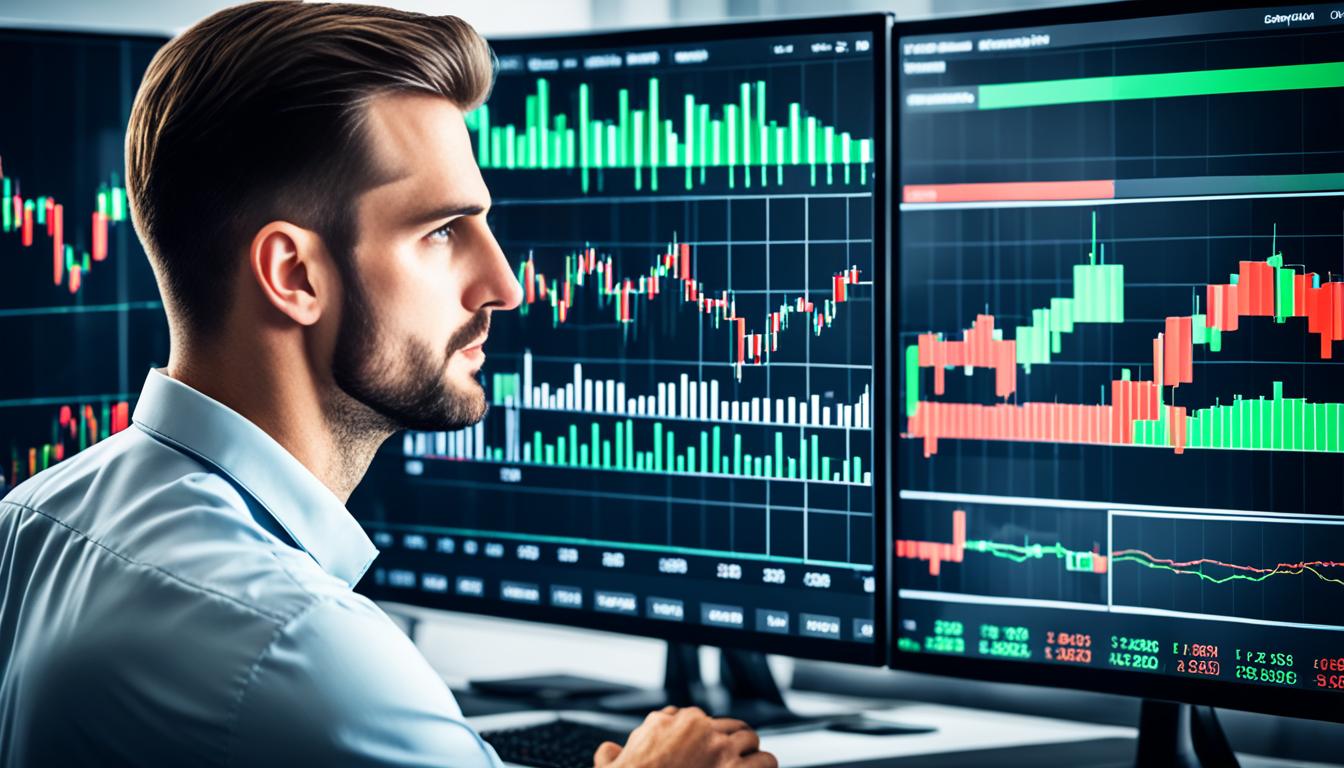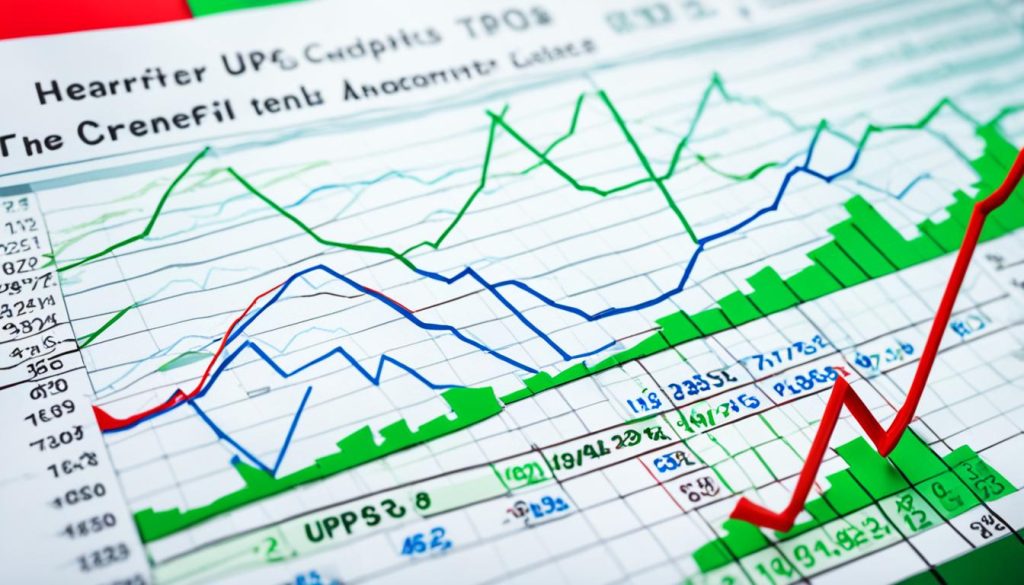Forex trade management is all about reducing risks and making more money in the forex market. It’s about knowing how much to bet based on your risk level and how much money you have. It also means understanding how your feelings can affect your trading decisions.
By being careful with risk and sticking to a plan, traders can do better in the forex market. This approach helps traders make smarter choices and avoid common mistakes.
Key Takeaways
- Proper forex trade management is key to cutting risks and boosting profits.
- Choosing the right bet size depends on how much risk you can handle and your account balance.
- Knowing how emotions can lead to bad trading decisions helps in avoiding them.
- Using a careful risk check and sticking to a plan improves your ability to navigate the market.
- These strategies can greatly improve your long-term trading success.
Introduction to Forex Trade Management
Forex trade management is key to doing well in trading. It’s important to know how to manage your trades to get better results. The first step is to set clear goals. This helps traders focus and aim for what they want from their trading.
Another important part is analyzing the market well. By looking at trends and economic signs, traders can make smart choices. It’s also vital to stick to a plan. This helps avoid making decisions based on feelings and keeps discipline in the fast-paced forex market.
Improving your trading strategy is about making it better to earn more and lose less. This means checking how you’re doing and changing things as needed. By making your strategy better, you can trade more efficiently, lose less money, and do better overall.
It’s important to spend time learning and using these basic steps. As traders get more into the forex market, being able to change and improve their strategies is key to doing well over time.
Effective Forex Risk Management Techniques
Forex risk management is key to keeping your trading capital safe. Using strategies like setting stop-loss levels and technical analysis can lessen financial risks. Diversifying your investments also helps spread out the risk.
Setting Stop-Loss and Take-Profit Levels
Setting stop-loss levels is a must for managing forex risks. A stop-loss order makes sure you exit a trade at a set price, capping losses. Take-profit levels let you secure profits when a certain price is hit. This keeps you disciplined and away from making impulsive trades.
Utilizing Technical Analysis for Risk Management
Technical analysis is crucial for managing forex risks. It helps you understand market trends, price patterns, and indicators. This knowledge lets you set smart stop-loss and take-profit levels. It’s a way to stay ahead and manage risks better.
Employing Diversification Strategies
Diversifying your investments is key to handling market ups and downs. By investing in different currency pairs and financial tools, you reduce the effect of bad market days. Diversification not only spreads out risk but also boosts your chances of steady returns.
Optimizing Your Forex Money Management Plan
An effective forex money management plan is key for a successful trading account. This part will cover vital practices to keep your trading journey balanced and healthy.
Budgeting and Allotting Funds for Trades
Budgeting is crucial in forex money management. Traders should set aside specific funds for each trade and not overcommit their capital. By limiting the money invested in each trade, traders can avoid big losses and trade more carefully.
Understanding Leverage and Its Risks
Leverage can be both a blessing and a curse in forex. It can increase profits but also losses. Traders need to understand the risks of leverage to avoid losing too much. Using leverage wisely means knowing about margin requirements and keeping leverage safe to protect your account.
Using Risk-Reward Ratios Effectively
The risk-reward ratio is key to a trade’s potential profit. Good forex money management means setting a risk-reward ratio where the reward is greater than the risk. This helps traders pick trades that meet their financial goals, improving their trading success.
| Factor | Description | Importance |
|---|---|---|
| Budgeting | Allocation of funds per trade | High |
| Leverage | Understanding and managing leverage risks | Critical |
| Risk-Reward Ratio | Determining potential profitability | Vital |
By using these strategies carefully, traders can improve their forex money management plan. This balance between ambition and caution helps protect their trading capital and keeps them in the forex market.
Strategies for Efficient Forex Trade Execution
Efficient forex trade execution needs a careful plan. It combines precise timing, understanding market liquidity, and using advanced automated trading systems. These elements help traders improve their strategies, cut down on mistakes, and boost their performance.
Timing Your Entries and Exits
Getting the timing right for entering and leaving trades is key. You need to look at market conditions, feelings, and technical signs. By knowing the best times to trade, you can increase your chances of making money.
Understanding Market Liquidity
Market liquidity greatly affects how smoothly trades are done in forex. Markets with a lot of liquidity have clear entry and exit points. This means trades can be made at expected prices with little price change. Knowing about liquidity helps you trade better and get ahead in the game.
Leveraging Automated Trading Systems
Automated trading systems are great for making trades fast and accurately. They cut down on mistakes and remove emotional decisions. This lets traders use strategies for different market conditions and adjust them as needed, making their trades better.
| Strategy | Benefits | Challenges |
|---|---|---|
| Timing Entries and Exits | Improved trade outcomes, avoidance of unfavorable snapshots | Requires significant market analysis and timing precision |
| Understanding Market Liquidity | Smoother trades, reduced slippage | Can be affected by market volatility and external factors |
| Leveraging Automated Trading Systems | Consistency, reduced errors, speed | Initial setup complexity, ongoing monitoring |
Enhancing Forex Trade Performance Analysis and Journaling
Improving in forex trading is possible with careful forex trade performance analysis and trade journaling. By looking closely at each trade, traders can find what works and what doesn’t. Here are important points to think about.
Maintaining a Detailed Trade Journal
Keeping a detailed trade journal is key. You should note down when you enter and leave a trade, why you made the trade, and what happened. Using a tool like TradesViz helps a lot. It syncs trades automatically and lets you customize your dashboards.
Using Performance Metrics to Analyze Trades
It’s vital to use numbers to see how well your trades are doing. Look at your win/loss ratio, average profit or loss, and the biggest loss you’ve faced. Tools that give detailed analytics make it easier to check how you’re doing.
Learning from Past Trades for Future Improvement
Looking back at past trades helps you learn. By studying both winning and losing trades, you can get better. Using tools for backtesting and analyzing options flow helps too. It turns past mistakes into lessons for the future.
| Trade Aspect | Details to Record | Performance Metric |
|---|---|---|
| Entry/Exit Points | Exact timestamps and price levels | Win/Loss Ratio |
| Reason for Trade | Justifications based on analysis | Average Profit/Loss |
| Outcome | Profit or loss in monetary terms | Maximum Drawdown |
Conclusion
Forex trading is a complex world that requires careful planning and strict discipline. To succeed, traders need to use strong forex trade management strategies. This includes managing risks, handling money wisely, executing trades well, and analyzing performance.
Managing risks is key to protecting your investments. This means setting stop-loss and take-profit levels and using diversification. A good money management plan is also crucial. It involves understanding leverage and using risk-reward ratios to stay financially stable.
Executing trades efficiently is important for better control and accuracy. This means entering and exiting the market at the right times and using automated systems. Keeping track of your trades and analyzing them helps you learn and improve your strategies. By being disciplined and systematic, traders can make forex trading profitable and sustainable.
FAQ
What is forex trade management and why is it important?
Forex trade management uses strategies to lower risk and increase profits in forex trading. It includes deciding the right lot size based on your risk level and account balance. It also looks at how emotions affect trading choices. Good forex trade management leads to better market success by carefully assessing risks and sticking to a plan.
How can I optimize my forex trade strategy?
To improve your forex trade strategy, set clear goals, analyze the market well, and trade consistently. Making your strategy better cuts down on losses and boosts your trading results. This way, you can adjust to market changes while keeping a strong trading plan.
What are the key techniques for effective forex risk management?
For good forex risk management, set stop-loss and take-profit levels, use technical analysis to guess market moves, and diversify your trades. These steps protect your money and lessen the impact of market ups and downs.
How do I budget and allocate funds for forex trades?
Plan your forex trade budget to avoid taking too much risk. Know about leverage and its risks, and use risk-reward ratios to spot good trades. Good money management keeps your trading account healthy and prevents over-risking.
What is the significance of timing entries and exits in forex trade execution?
Getting the timing right for entering and exiting trades is key. It means understanding the market, sentiment, and technical signs. Market liquidity also matters, affecting how easily you can trade. Good timing boosts profits and cuts risk.
How can automated trading systems benefit forex trading?
Automated trading systems execute trades with precision and speed, cutting down on mistakes and emotional influence. They find trades based on set rules and trade quickly, making sure trades are done well even in fast markets.
Why is maintaining a detailed trade journal important for forex trading?
Keeping a detailed trade journal is vital for tracking and reviewing trades. It helps spot patterns and strategies that succeed or fail. By recording trades, traders can analyze their performance objectively and make informed decisions. Learning from past trades is key to improving strategies and trading over time.






